Vou voltar
Sei que ainda vou voltar
Para o meu lugar
Foi lá e é ainda lá
Que eu hei de ouvir cantar
Uma sabiá
Cantar uma sabiá
Vou voltar
Sei que ainda vou voltar
Vou deitar à sombra
De uma palmeira
Que já não há
Colher a flor
Que já não dá
E algum amor
Talvez possa espantar
As noites que eu não queria
E anunciar o dia
Vou voltar
Sei que ainda vou voltar
Não vai ser em vão
Que fiz tantos planos
De me enganar
Como fiz enganos
De me encontrar
Como fiz estradas
De me perder
Fiz de tudo e nada
De te esquecer
Vou voltar
Sei que ainda vou voltar
Para o meu lugar
Foi lá e é ainda lá
Que eu hei de ouvir cantar
Uma sabiá
Cantar uma sabiá
Sei que ainda vou voltar
Para o meu lugar
Foi lá e é ainda lá
Que eu hei de ouvir cantar
Uma sabiá
Cantar uma sabiá
Vou voltar
Sei que ainda vou voltar
Vou deitar à sombra
De uma palmeira
Que já não há
Colher a flor
Que já não dá
E algum amor
Talvez possa espantar
As noites que eu não queria
E anunciar o dia
Vou voltar
Sei que ainda vou voltar
Não vai ser em vão
Que fiz tantos planos
De me enganar
Como fiz enganos
De me encontrar
Como fiz estradas
De me perder
Fiz de tudo e nada
De te esquecer
Vou voltar
Sei que ainda vou voltar
Para o meu lugar
Foi lá e é ainda lá
Que eu hei de ouvir cantar
Uma sabiá
Cantar uma sabiá
Contributed by Bartleby - 2012/2/14 - 10:52
Language: Italian
Traduzione italiana dal blog Damnatio Memoriae – La pattumiera della Storia
SABIÁ
Tornerò,
so che tornerò
nel mio posto
fu là ed è ancora là
che devo sentire il canto
di un sabià
Tornerò,
so che tornerò
mi sdraierò all'ombra
di una palma
che non c'è più
raccogliere il fiore
che non sboccia più
e forse un qualche amore
potrà allontanare
le notti che non volevo
e annunciare il giorno
Tornerò,
so che tornerò
non saranno stati fatti invano
tanti progetti
per ingannarmi
tante erranze
per trovarmi
tante strade
per perdermi
ho fatto tutto per niente
non ti dimenticherò
Tornerò,
so che tornerò
e per restare
so che l'amore esiste
non sono più triste
e la solitudine finirà
Tornerò,
so che tornerò
nel mio posto
fu là ed è ancora là
che devo sentire il canto
di un sabià
Tornerò,
so che tornerò
mi sdraierò all'ombra
di una palma
che non c'è più
raccogliere il fiore
che non sboccia più
e forse un qualche amore
potrà allontanare
le notti che non volevo
e annunciare il giorno
Tornerò,
so che tornerò
non saranno stati fatti invano
tanti progetti
per ingannarmi
tante erranze
per trovarmi
tante strade
per perdermi
ho fatto tutto per niente
non ti dimenticherò
Tornerò,
so che tornerò
e per restare
so che l'amore esiste
non sono più triste
e la solitudine finirà
Contributed by Bartleby - 2012/2/14 - 10:53
Language: French
LA MÉSANGE
Chante comme la mésange, chante comme, comme tu chantais
Pour moi il y a bien longtemps
Que je fasse un long voyage а travers le temps
Chante encore la mésange, chante encore, que je sente l'ombre
De la forкt qui n'existe plus
L'odeur du vent qui s'est perdu
Et que des fleurs, plus belles que jamais
Quittant la prison, dйlivrent soudain, revivre, revivre
Chante encore la mésange, chante encore que je puisse enfin
Revoir l'horizon au bout du chemin
Boire а la fontaine du lendemain
Goыter la saveur qu'avait chaque jour
Lorsque j'attendais mon premier amour
Chante comme la mésange, chante comme, comme tu chantais
Pour moi il y a bien longtemps
Que je fasse un long voyage а travers le temps
Chante encore la mésange, chante encore, que je sente l'ombre
De la forкt qui n'existe plus
L'odeur du vent qui s'est perdu
Et que des fleurs, plus belles que jamais
Quittant la prison, dйlivrent soudain, revivre, revivre
Chante encore la mésange, chante encore que je puisse enfin
Revoir l'horizon au bout du chemin
Boire а la fontaine du lendemain
Goыter la saveur qu'avait chaque jour
Lorsque j'attendais mon premier amour
Contributed by dq82 - 2022/1/11 - 09:09
Language: English
Versione inglese di Frank Sinatra
Lady Day / Songs Of The Sabiá (1970)
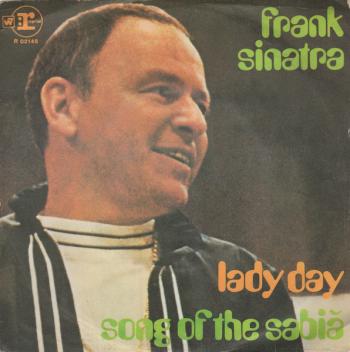
In 1969, Frank Sinatra and Jobim recorded "The Song of the Sabiá" for an album entitled Sinatra-Jobim, but at the last minute, Sinatra stopped release of the record. Seven of the ten songs from those sessions were released in 1971 as Side A of Sinatra & Company, but "The Song of the Sabiá" was not used. It appeared as the B-side of Sinatra's single “Lady Day” (Reprise 0970) in December 1970, and was later included on Portrait of Sinatra – Forty Songs from the Life of a Man (1977), Sinatra–Jobim Sessions (1979) and Sinatra/Jobim: The Complete Reprise Recordings (2010).
Lady Day / Songs Of The Sabiá (1970)

In 1969, Frank Sinatra and Jobim recorded "The Song of the Sabiá" for an album entitled Sinatra-Jobim, but at the last minute, Sinatra stopped release of the record. Seven of the ten songs from those sessions were released in 1971 as Side A of Sinatra & Company, but "The Song of the Sabiá" was not used. It appeared as the B-side of Sinatra's single “Lady Day” (Reprise 0970) in December 1970, and was later included on Portrait of Sinatra – Forty Songs from the Life of a Man (1977), Sinatra–Jobim Sessions (1979) and Sinatra/Jobim: The Complete Reprise Recordings (2010).
SONG OF THE SABIÁ
I'll go back, I know now that I'll go back, that my place is there,
And there it will always be, there where I can hear the Song of the Sabia.
I'll go back, I know now that I'll go back, I will lie in the shadow of
A palm that's no longer there, and pick a flower that doesn't grow.
And maybe someone's love will speak the night.
The lonely unwanted light that may bring me through the new day.
I'll go back, I know now that I'll go back, they won't be in vain,
All the plans I made to deceive myself, all the rose I made just to lose myself,
All the love I made to forget myself, those mistakes I made just to find myself.
I'll go back, I know now that I'll go back, that my place is there,
And there it will always be, there where I can hear the Song of the Sabia.
Of the Sabia.
I'll go back, I know now that I'll go back, that my place is there,
And there it will always be, there where I can hear the Song of the Sabia.
I'll go back, I know now that I'll go back, I will lie in the shadow of
A palm that's no longer there, and pick a flower that doesn't grow.
And maybe someone's love will speak the night.
The lonely unwanted light that may bring me through the new day.
I'll go back, I know now that I'll go back, they won't be in vain,
All the plans I made to deceive myself, all the rose I made just to lose myself,
All the love I made to forget myself, those mistakes I made just to find myself.
I'll go back, I know now that I'll go back, that my place is there,
And there it will always be, there where I can hear the Song of the Sabia.
Of the Sabia.
Contributed by dq82 - 2022/1/11 - 09:12
Il testo di “Sabiá” è ispirato a “Canção do exílio” scritta nel 1843 dal poeta brasiliano Gonçalves Dias (1823-1864), una delle poesie in lingua portoghese più famose di sempre.
CANÇÃO DO EXÍLIO
Minha terra tem palmeiras,
Onde canta o Sabiá;
As aves que aqui gorjeiam,
Não gorjeiam como lá.
Nosso céu tem mais estrelas,
Nossas várzeas têm mais flores,
Nossos bosques têm mais vida,
Nossa vida mais amores.
Em cismar, sozinho, à noite,
Mais prazer encontro eu lá;
Minha terra tem palmeiras,
Onde canta o Sabiá.
Minha terra tem primores,
Que tais não encontro eu cá;
Em cismar - sozinho, à noite -
Mais prazer encontro eu lá;
Minha terra tem palmeiras,
Onde canta o Sabiá.
Não permita Deus que eu morra,
Sem que eu volte para lá;
Sem que desfrute os primores
Que não encontro por cá;
Sem qu'inda aviste as palmeiras,
Onde canta o Sabiá.
CANÇÃO DO EXÍLIO
Minha terra tem palmeiras,
Onde canta o Sabiá;
As aves que aqui gorjeiam,
Não gorjeiam como lá.
Nosso céu tem mais estrelas,
Nossas várzeas têm mais flores,
Nossos bosques têm mais vida,
Nossa vida mais amores.
Em cismar, sozinho, à noite,
Mais prazer encontro eu lá;
Minha terra tem palmeiras,
Onde canta o Sabiá.
Minha terra tem primores,
Que tais não encontro eu cá;
Em cismar - sozinho, à noite -
Mais prazer encontro eu lá;
Minha terra tem palmeiras,
Onde canta o Sabiá.
Não permita Deus que eu morra,
Sem que eu volte para lá;
Sem que desfrute os primores
Que não encontro por cá;
Sem qu'inda aviste as palmeiras,
Onde canta o Sabiá.
Bartleby - 2012/2/14 - 11:02
Segnalo che l'anno successivo la canzone è stata incisa in francese da Françoise Hardy.
Vito Vita - 2022/1/11 - 05:29
×
![]()
Note for non-Italian users: Sorry, though the interface of this website is translated into English, most commentaries and biographies are in Italian and/or in other languages like French, German, Spanish, Russian etc.

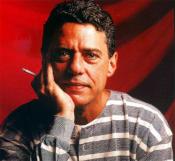

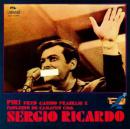

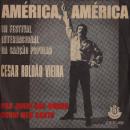
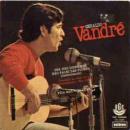
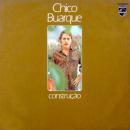
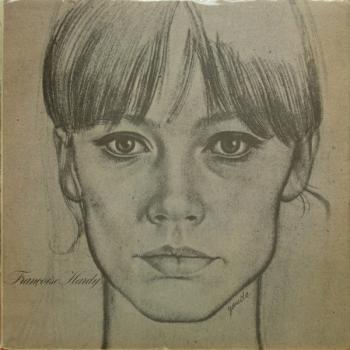
Parole di Chico Buarque de Hollanda
Musica di Tom Jobim
Nell’album “Não vai Passar, vol. 4”
Il 1968 fu un anno tristemente cruciale per il Brasile. Il controllo sulla società esercitato dalla giunta militare al potere divenne totale grazie all’emanazione del famigerato Ato Institucional Nº5 (AI-5). Venne esautorato il Parlamento, sospesi i diritti politici, proibite le manifestazioni, sospeso l’habeas corpus nel caso di delitti di natura politica e attivata una censura feroce su tutte le espressioni artistiche.
Per questo, quando al III Festival Internacional da Canção presentò la sua bellissima ed esplicita Pra não dizer que não falei das flores [Caminhando], Geraldo Vandré sapeva di rischiare molto. Non vollero invece rischiare troppo i giurati che, su pressione del presidente e disattendendo l’ovazione che il pubblico aveva decretato alla canzone, fecero vincere “Sabiá” di Chico Buarque e Tom Jobim, interpretata dal duo femminile Cynara e Cybele.
Eppure anche “Sabiá” era una canzone politica, sebbene Chico Buarque, a differenza di Vandré avesse scelto un profilo più basso, più “nicodemita”, ricorrendo nella sua produzione ad un gran numero di metafore, di analogie e all’antitesi per prendersi gioco della censura senza essere costretto a tacere il proprio punto di vista. Ma ciò nonostante anche il più prudente Chico Buarque sarà costretto di lì a poco ad un lungo soggiorno all’estero, e questa canzone costituisce in qualche modo la premonizione dell’imminente esilio.
“Il sabià è un uccello, un tordo diffuso in America Latina, la cui grande musicalità rimanda alla figura del poeta che canta la nostalgia per la sua terra. La canzone, per un ascoltatore brasiliano, si situa così in un preciso contesto letterario, quello romantico dell'evocazione struggente del paesaggio brasiliano, in particolare per il lirismo della melodia di Tom Jobim.
Ma i versi di Chico Buarque rappresentano tutto il contrario di una fuga nella fantasticheria della ‘saudade’ e sembrano scritti in una sorta d'istinto premonitorio del prossimo esilio a Roma cui lo costrinsero la censura ed il fiato pesante del regime.” (dal blog Damnatio Memoriae – La pattumiera della Storia)